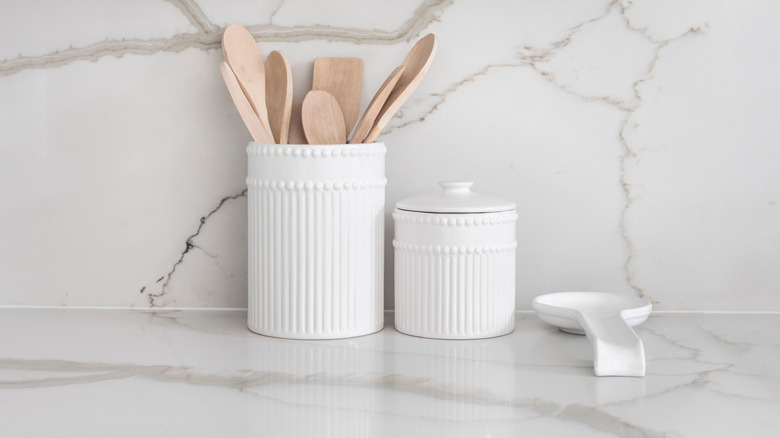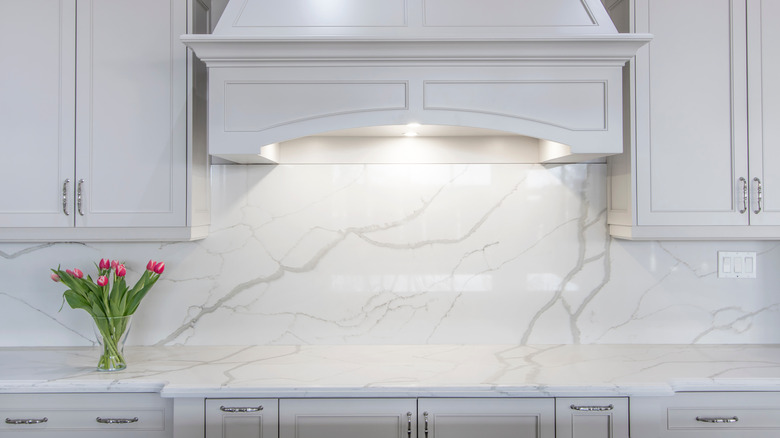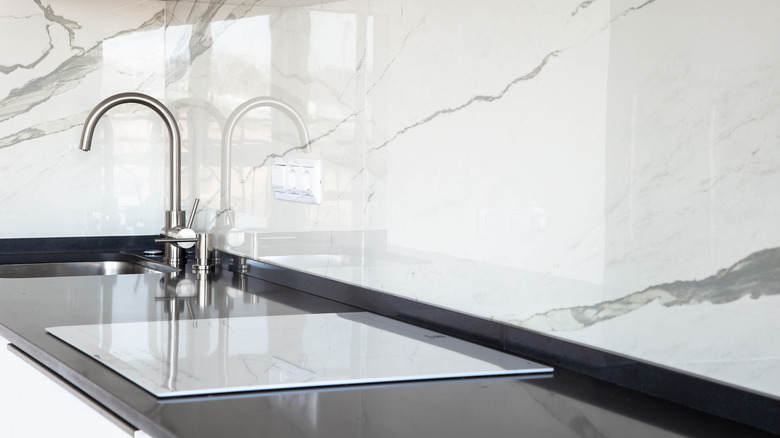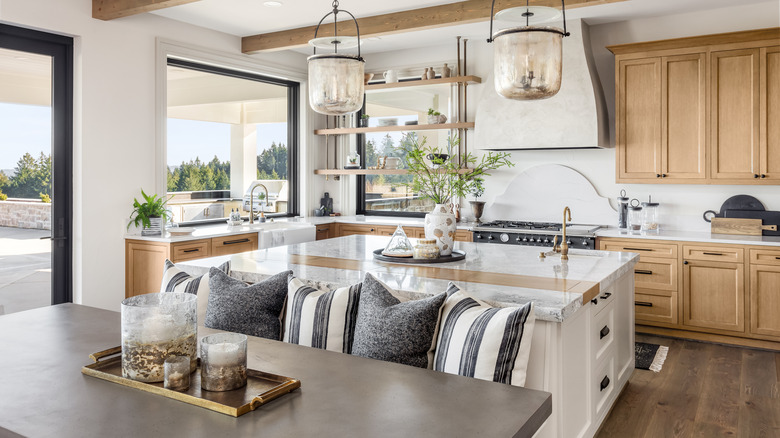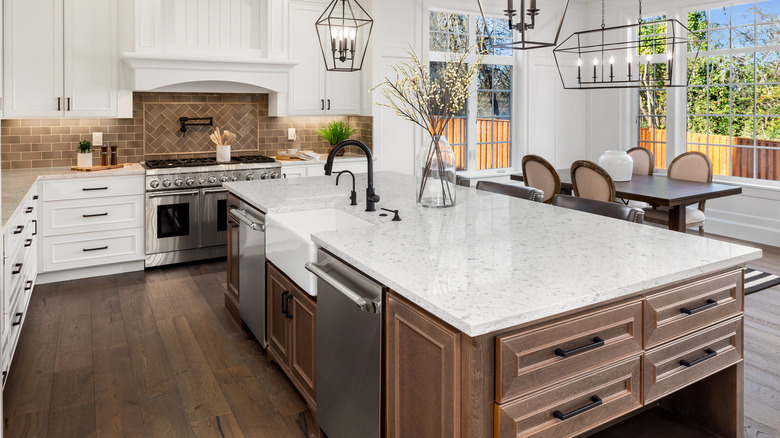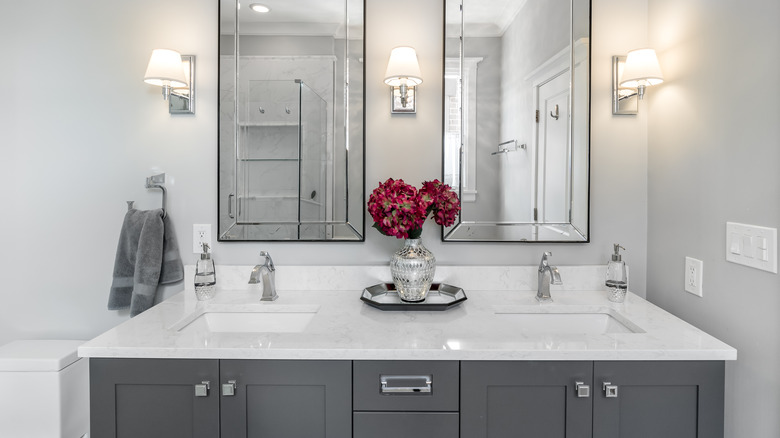How Much Does It Cost To Add Quartz Countertops?
The countertop is arguable the most important element in your kitchen. It not only serves as a crucial working surface, but its design could make or break the overall aesthetic appeal of the entire room. Today, quartz countertops are increasingly growing in popularity because they are both tough and eye-catching. However, you should be careful not to confuse quartz countertops with the original stone-cut quartzite. Quartz is an engineered material that offers a unique balance of durability and luxurious aesthetic appeal.
So how much does it cost to add quartz countertops? Well, HomeAdvisor details that the average cost of installing a quartz countertop, including labor costs, is $125 per square foot, but the cost could range anywhere between $50 and $200 a square foot depending on a few different factors. The cost of materials on their own is approximately between $50 and $100 per square foot. This post breaks down the various costs associated with adding quartz countertops to your kitchen and will help you budget accordingly.
Factors for cost
There are quite a few factors that influence how much installation will cost. In fact, adding a new countertop often poses more challenges than most people imagine. As Angi explains, here are a few factors other than the cost of materials and labor that will influence the overall price.
Cabinet leveling
The first thing done after removing the old countertop is preparing the cabinets for new installation. One way that installers do this is to level the cabinets to evenly carry the weight of the new countertop. Depending on the weight of the new quartz countertop, additional reinforcements to your cabinets may be necessary, lest the frame breaks down. Remember, the more complex the leveling process is, the more costly it will be.
The type of edge treatment
The choice of edge treatment will definitely influence the overall cost. Edging is quite an important feature that also allows for some additional personalization, rather than just the standard 90-degree cut. While the common type of edging is the bevel edge, some manufacturers offer other bespoke edge treatments with unique patterns. Such unique edging treatment options come with additional costs of approximately between $5 to $45 per square foot. Usually, the standard edge treatments are done at no extra cost, but if you have some money to splurge, you can go for the more unique edge treatment options available.
Polish and sealing
Since quartz is not porous, sealing is not necessary but can be done if you so wish. Having said that, polishing the surface of the quartz countertop is very important and cannot be ignored. Polishing leaves your countertop with a classy, shiny appearance that will transform the ambiance of your kitchen. You can choose from three types of finishes: honed, suede, and polished. Depending on the option you prefer, the average cost ranges from $4 to $6 per square foot of countertop.
Delivery costs
It's quite common to be charged fees for delivery of your new countertop, the costs depending on your location and that of the fabrication company, per Fixr. A company may charge a fixed fee, but it is more likely that they will calculate the cost based on the distance they must travel to your location. However, an approximate average of the delivery fees to expect is between $100 to $200 for every countertop.
Additional costs
The overall cost of a renovation is rarely exactly the same as the initial quote, and so when budgeting for a new quartz countertop it's important to consider all factors, however small or inconsequential they might seem. From Fixr, here's a rundown of a few more factors you may not realize could increase what you end up paying overall.
Popularity
Over recent years, quartz countertops have seen an increase in popularity thanks to their durability and easy-to-maintain characteristics. In fact, quartz countertops have even surpassed granite as the top choice among homeowners. With the increase in demand, you should expect an increase in price as well. If you received an estimate in years past, it may be lower than the current market price. The increase in popularity, however, also makes quartz countertops a good prospect if you are planning to resell your home sometime in the future.
Interior design
Some interior design features like installing a backsplash will add to the overall cost as well. Installation of a quartz backsplash will cost you less than that of your countertops, but still runs about $40 to $60 per square foot. Keep in mind that since installing a backsplash is too complicated for a DIY approach, you'll have to consider additional labor costs as well.
Removal of old plumbing
Out of choice, some homeowners choose to do a complete upgrade of the kitchen, including a rework of some plumbing fixtures as well. This process would involve removing appliances affixed below the countertop and can cost anywhere between $200 to $300, though heavier appliances might run you a bit more, explains Angi. Removal of plumbing, on the other hand, costs up to $85 per square foot.
Types of quartz countertops
There is no denying that quartz countertops are among the best you can get for your kitchen. Now that you have settled for quartz, the next important decision will be selecting the quality of the slab. Here are three types you can choose from, according to Bob Vila.
First choice
When it comes to quality, the first choice type is at the top of the range. This tier of quality is available in a variety of colors, and is distinguished in part by little-to-no visible veining. If you want a sleeker look, you'll be delighted to spend each day in your kitchen admiring the smooth, unblemished finish. Due to its impeccable quality, prices per square foot range between $75 and $200.
Commercial
Better referred to as the builder's grade quartz, this category is the second-best when it comes to the quality of the slab. It costs roughly between $65 and $75 for every square foot and is the most commonly used countertop material.
Second choice
Different from the first choice tier, this type of slab is not as shiny or vivid in color. What's more, you should expect some veining and minor discoloration. While its aesthetic appeal may be lacking in comparison to higher quality quartz, it is important to emphasize that it is equally as strong and durable. The second choice quality grade is the least expensive option, the cost ranging between $50 and $65 per square foot.
Why do you need quartz countertops?
The primary function of installing countertops is function and aesthetics, but you may be wondering why else you might want to choose quartz over other countertop materials. According to Bob Vila, these should be your major motivating factors:
Customizable design and versatile style
As far as aesthetics are concerned, quartz countertops can easily fulfill whatever you're envisioning. Whether you're seeking a classic rustic appearance or something sleekly modern, you're sure to find something that fits. Another option is a specific pattern that resembles the appearance of other natural materials like stone or granite. You can even request a specific color or pattern, as each one of these designs can be controlled right from the manufacturing process.
Good return on investment
This type of countertop will last you a long while. In fact, a well-installed quartz countertop has a life span of over 10 years. Furthermore, its easy maintenance means you won't have to invest in expensive cleaning agents, as those costs can add up over the years. Best of all, you won't have to worry about frequent repairs or polishing to keep it in tip-top shape.
Benefits of quartz countertops
As mentioned earlier, quartz countertops are becoming increasingly popular as homeowners learn about the many benefits. If you are thinking of adding a quartz countertop to your kitchen, International Granite & Stone explains exactly how it can enhance your space.
They are tough and durable
To fully appreciate the durability of quartz countertops, you should understand the build composition of this material. Unlike quartzite, quartz is man-made and has a higher percentage of quartz compared to other materials. The high percentage of quartz makes the countertops exceptionally tough and resistant to scratches, meaning you won't have to worry as much about chips if you accidentally put down utensils or cookware a bit too roughly.
They are non-porous
For a kitchen surface, a non-porous countertop comes with several advantages. First off, such surfaces do not absorb any liquid, making them more resistant to staining. It goes without saying that it's really not possible to avoid spilling oils or other substances on your countertop, so getting a countertop that rarely stains makes more sense to many homeowners.
Easy maintenance
One of the many perks that come with adding a quartz countertop is its easy maintenance. Unlike other countertop materials such as granite which requires a sealant coat that you must be careful not to damage, cleaning your quartz countertop is a breeze. All you need is regular soap, some water, and a cloth to remove any mess or spills.
